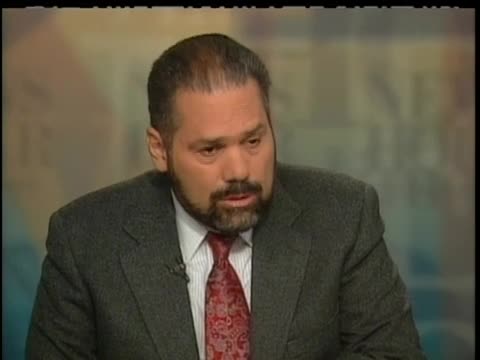The NewsHour with Jim Lehrer; November 6, 2007
- Series
- The NewsHour with Jim Lehrer
- Episode
- November 6, 2007
- Producing Organization
- NewsHour Productions
- Contributing Organization
- NewsHour Productions (Washington, District of Columbia)
- AAPB ID
- cpb-aacip-507-599z02zq9b
If you have more information about this item than what is given here, or if you have concerns about this record, we want to know! Contact us, indicating the AAPB ID (cpb-aacip-507-599z02zq9b).
- Description
- Episode Description
- This episode of The NewsHour includes a report on day four in Pakistan's emergency rule; a look at how the presidential candidates are handling climate change; a report on social networking sites' use of advertising and privacy concerns; and a look at successful efforts to fight AIDS in Rwanda.
- Date
- 2007-11-06
- Asset type
- Episode
- Rights
- Copyright NewsHour Productions, LLC. Licensed under a Creative Commons Attribution-NonCommercial-NoDerivatives 4.0 International Public License (https://creativecommons.org/licenses/by-nc-nd/4.0/legalcode)
- Media type
- Moving Image
- Duration
- 01:04:04
- Credits
-
-
Producing Organization: NewsHour Productions
- AAPB Contributor Holdings
-
NewsHour Productions
Identifier: cpb-aacip-dc8c55bc1a9 (Filename)
Format: Betacam: SP
Generation: Preservation
Duration: 01:00:00;00
-
Identifier: cpb-aacip-36228c727e3 (unknown)
Format: video/mp4
Generation: Proxy
Duration: 01:04:04
If you have a copy of this asset and would like us to add it to our catalog, please contact us.
- Citations
- Chicago: “The NewsHour with Jim Lehrer; November 6, 2007,” 2007-11-06, NewsHour Productions, American Archive of Public Broadcasting (GBH and the Library of Congress), Boston, MA and Washington, DC, accessed February 23, 2026, http://americanarchive.org/catalog/cpb-aacip-507-599z02zq9b.
- MLA: “The NewsHour with Jim Lehrer; November 6, 2007.” 2007-11-06. NewsHour Productions, American Archive of Public Broadcasting (GBH and the Library of Congress), Boston, MA and Washington, DC. Web. February 23, 2026. <http://americanarchive.org/catalog/cpb-aacip-507-599z02zq9b>.
- APA: The NewsHour with Jim Lehrer; November 6, 2007. Boston, MA: NewsHour Productions, American Archive of Public Broadcasting (GBH and the Library of Congress), Boston, MA and Washington, DC. Retrieved from http://americanarchive.org/catalog/cpb-aacip-507-599z02zq9b
